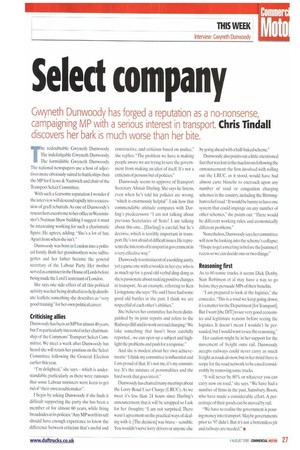Select company
Page 27

If you've noticed an error in this article please click here to report it so we can fix it.
Gwyneth Dunwoody has forged a reputation as a no-nonsense, campaigning MP with a serious interest in transport. Chris Tindall discovers her bark is much worse than her bite.
The redoubtable Gwyneth Dunwoody. The indefatigable Gwyneth Dunwoody. The formidable Gwyneth Dunwoody. The national newspapers use a host of adjectives more obviously suited to battleships than the MP for Crewe & Nantwich and chair of the Transport Select Committee.
With such a fearsome reputation I wonder if the interview will descend rapidly into a succession of gruff rebuttals. As one of Dunwoody's researchers escorts me to her office in Westminster's Norman Shaw building I suggest it must be interesting working for such a charismatic figure. He agrees, adding: "She's a lot of fun. Apart from when she isn't.
Dunwoody was born in London into a political family. Both her grandmothers were suffragettes and her father became the general secretary of the Labour Party. Her mother served as a minister in the House of Lords before being made the Lord Lieutenant of London.
She says one side-effect of all this political activity was her being drafted in to help distribute leaflets; something she describes as -very good training" for her own political career.
Criticising allies
Dunwoody has been an MP for almost 40 years, but I'm particularly interested in her chairmanship of the Commons' Transport Select Committee. We meet a week after Dunwoody has heard she will retain her position on the Select Committee following the General Election earlier this year.
-I'm delighted,she says which is understandable, particularly as there were rumours that some Labour ministers were keen to get rid of-their own troublemaker".
begin by asking Dunwoody if she finds it difficult supporting the party she has been a member of for almost 60 years, while firing broadsides at its policies. "Any MP worth its salt should have enough experience to know the difference between criticism that's useful and constructive, and criticism based on malice," she replies. "The problem we have is making people aware we are trying to save the government from making an idiot of itself. It's not a criticism of persons but of policies."
Dunwoody seems to approve of Transport Secretary Alistair Darling. She says he listens, even when he's told his policies are wrong, "which is enormously helpful". I ask how that commendable attitude compares with Darling's predecessors: "I am not talking about previous Secretaries of State! 1 am talking about this one... [Darling] is careful, but he's decisive, which is terribly important in transport. He's not afraid of difficult issues. He represents the interests of transport in government in a very effective way."
Dun woody is reminiscent of a scolding aunty, yet a game one with a twinkle in her eye, who is as much up for a good old verbal ding-dung as she is passionate about making positive changes in transport. As an example, referring to Ken Livingstone she says: "He and I have had some good old battles in the past. I think we are respectful of each other's abilities."
She believes her committee has been distinguished by its joint reports and refers to the Railways Bill and its work on road charging:"We take something that hasn't been carefully reported... we can open up a subject and highlight the problems and push for a response."
And she is modest about her own achievements:1 think my committee is influential and I am proud of that. It's not me, it's my committee. It's the mixture of personalities and the hard work that goes into it."
Dunwoody has chaired many meetings about the Lorry Road User Charge (LRUC). As we meet it's less than 24 hours since Darling's announcement that it will be scrapped so I ask for her thoughts: "I am not surprised. There wasn't agreement on the practical ways of dealing with it. [The decision] was brave sensible. You wouldn't serve lorry drivers or anyone else by going ahead with a half-baked scheme."
Dunwoody also points out a little-mentioned fact that was lost in the maelstrom following the announcement: the firm involved with rolling out the LRUC, as it stood. would have had almost carte blanche to encroach upon any number of road or congestion charging schemes in the country. including the Birmingham relief road."It would be barmy to have one system that could impinge on any number of other schemes,she points out. -There would be different working rules, and economically different problems."
Nonetheless. Dunwoody says her committee will now be looking into the scheme's collapse: "1 hope to get a meeting in before the [summer] recess so we can decide one or two things."
Reasoning first
As to 60-tonne trucks, it seems Dick Denby, Stan Robinson et al may have a way to go before they persuade MPs of their benefits.
"I am prepared to look at the logistics," she concedes. -This is a road we keep going down; it's a matter for the Department [forTransport]. But I want [the DM to see very good economics and legitimate reasons before seeing the logistics. It doesn't mean I wouldn't be persuaded, but I would want to see the reasoning."
Her caution might lie in her support for the movement of freight onto rail. Dunwoody accepts railways could never carry as much freight as roads do now, but in her mind there is scope for the road network to be eased considerably by removing some trucks.
"It will never be 80% or whatever you can carry now on road,she says. "We have had a number of firms in the past, Sainsbury., Boots, who have made a considerable effort. A percentage of their goods can be moved by rail.
"We have to realise the government is pouring money into transport. Maybe governments prior to '97 didn't. But it's not a bottomless pit and railways are needed." •




































































































































































































